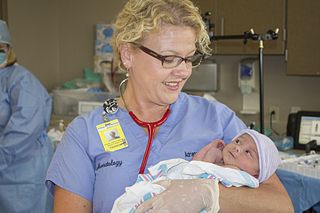
A registered nurse (RN) is a nurse who has graduated from a nursing program and met the requirements outlined by a country, state, province or similar government-authorized licensing body to obtain a nursing license. An RN's scope of practice is determined by legislation, and is regulated by a professional body or council.

An oncology nurse is a specialized nurse who cares for cancer patients. These nurses require advanced certifications and clinical experiences in oncology further than the typical baccalaureate nursing program provides. Oncology nursing care can be defined as meeting the various needs of oncology patients during the time of their disease including appropriate screenings and other preventive practices, symptom management, care to retain as much normal functioning as possible, and supportive measures upon end of life.
Nursing credentials and certifications are the various credentials and certifications that a person must have to practice nursing legally. Nurses' postnominal letters reflect their credentials—that is, their achievements in nursing education, licensure, certification, and fellowship. The letters usually appear in the following order:
Orthopaedic nursing is a nursing specialty focused on the prevention and treatment of musculoskeletal disorders. Orthopaedic issues range from acute problems such as fractures or hospitalization for joint replacement to chronic systemic disorders such as loss of bone density or lupus erythematosus.

Critical care nursing is the field of nursing with a focus on the utmost care of the critically ill or unstable patients following extensive injury, surgery or life threatening diseases. Critical care nurses can be found working in a wide variety of environments and specialties, such as general intensive care units, medical intensive care units, surgical intensive care units, trauma intensive care units, coronary care units, cardiothoracic intensive care units, burns unit, paediatrics and some trauma center emergency departments. These specialists generally take care of critically ill patients who require mechanical ventilation by way of endotracheal intubation and/or titratable vasoactive intravenous medications.

Emergency nursing is a specialty within the field of professional nursing focusing on the care of patients who require prompt medical attention to avoid long-term disability or death. In addition to addressing "true emergencies," emergency nurses increasingly care for people who are unwilling or unable to get primary medical care elsewhere and come to emergency departments for help. In fact, only a small percentage of emergency department (ED) patients have emergency conditions such as a stroke, heart attack or major trauma. Emergency nurses also tend to patients with acute alcohol and/or drug intoxication, psychiatric and behavioral problems and those who have been raped.

Georgetown UniversitySchool of Nursing & Health Studies (NHS) is one of the five undergraduate schools of Georgetown University. Founded in 1903 as the School of Nursing, it added three other health related majors in 1999 and appended its name to become the School of Nursing & Health Studies. The school has been at the forefront of education in the health care field, offering many programs unique to America's elite institutions. Offering undergraduate and graduate programs in the health sciences, graduates are prepared to enter the complex fields of medicine, law, health policy, and nursing. NHS is made up of the Department of Health Systems Administration, the Department of Human Science, the Department of International Health, and the Department of Nursing.
The American Nurses Credentialing Center (ANCC), a subsidiary of the American Nurses Association (ANA), is a certification body for nursing board certification and the largest certification body for advanced practice registered nurses in the United States, as of 2011 certifying over 75,000 APRNs, including nurse practitioners and clinical nurse specialists.

A family nurse practitioner (FNP) provides continuing and comprehensive healthcare for the individual and family across all ages, genders, diseases, and body systems. Primary care emphasizes the holistic nature of health and it is based on knowledge of the patient in the context of the family and the community, emphasizing disease prevention and health promotion.
Obstetrical nursing, also called perinatal nursing, is a nursing specialty that works with patients who are attempting to become pregnant, are currently pregnant, or have recently delivered. Obstetrical nurses help provide prenatal care and testing, care of patients experiencing pregnancy complications, care during labor and delivery, and care of patients following delivery. Obstetrical nurses work closely with obstetricians, midwives, and nurse practitioners. They also provide supervision of patient care technicians and surgical technologists.
In the United States, a registered nurse certified in maternal newborn nursing (RNC-MNN) is a obstetrical nurse who has earned a nursing board certification from the National Certification Corporation in maternal/newborn nursing.
In the United States, a registered nurse certified in neonatal intensive care (RNC-NIC) is a neonatal intensive care nurse who has earned nursing board certification. The certification is established by an exam that is one of the core certification exams offered by the National Certification Corporation (NCC).
The Oncology Nursing Certification Corporation (ONCC) is a nonprofit organization established for the development, administration, and evaluation of programs for certification in oncology nursing. Incorporated in 1984 and governed by a board of directors, ONCC is the certifying body for oncology nursing and meets standards established by the Accreditation Board for Specialty Nursing Certification. It is accredited by the National Commission for Certifying Agencies.
Hyperbaric nursing is a nursing specialty involved in the care of patients receiving hyperbaric oxygen therapy. The National Board of Diving and Hyperbaric Medical Technology offers certification in hyperbaric nursing as a Certified Hyperbaric Registered Nurse (CHRN). The professional nursing organization for hyperbaric nursing is the Baromedical Nurses Association.
The National Certification Corporation (NCC) was established for the development, administration, and evaluation of a program for certification in obstetric, gynecologic and neo-natal nursing specialties in the United States. Incorporated in 1975 and governed by a board of directors, NCC's certification program is accredited by the National Commission for Certifying Agencies (NCCA), the accreditation body of the Institute for Credentialing Excellence. By 2009, NCC had awarded over 95,000 certifications and certificates of added qualification.
In the United States, a registered nurse certified in low-risk neonatal nursing (RNC-LRN) is a neonatal nurse who has earned nursing board certification from the National Certification Corporation in low-risk neonatal nursing.
Women's Health Care Nurse Practitioner-Board Certified (WHNP-BC) is the designation for a women's health nurse practitioner who has earned nursing board certification from the National Certification Corporation.
Public health nursing, also known as community health nursing is a nursing specialty focused on public health. The term was coined by Lillian Wald of the Henry Street Settlement, or, Public health nurses (PHNs) or community health nurses "integrate community involvement and knowledge about the entire population with personal, clinical understandings of the health and illness experiences of individuals and families within the population." Public health nursing in the United States traces back to a nurse named Lillian Wald who, in 1893, established the Henry Street Settlement in New York City and coined the expression "public health nurse". A Public or Community Health Nurse is expected to comply with the duties and limitations of the American Nurse Association (ANA) publication Public Health Nursing: Scope and Standards of Practice.

A neonatal nurse practitioner (NNP) is an advanced practice registered nurse (APRN) with at least 2 years experience as a bedside registered nurse in a Level III NICU, who is prepared to practice across the continuum, providing primary, acute, chronic, and critical care to neonates, infants, and toddlers through age 2. Primarily working in neonatal intensive care unit (NICU) settings, NNPs select and perform clinically indicated advanced diagnostic and therapeutic invasive procedures. In the United States, a board certified neonatal nurse practitioner (NNP-BC) is an APRN who has acquired Graduate education at the master’s or doctoral level and has a board certification in neonatology. The National Association of Neonatal Nurse Practitioners (NANNP) is the national association that represents neonatal nurse practitioners in the United States. Certification is governed by the National Certification Corporation for Obstetrics, Gynecologic and Neonatal Nursing Specialties (NCC).








